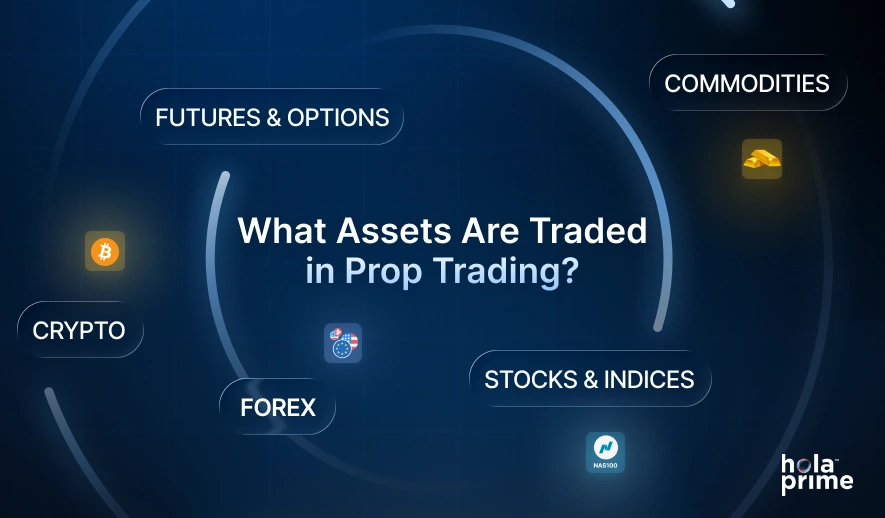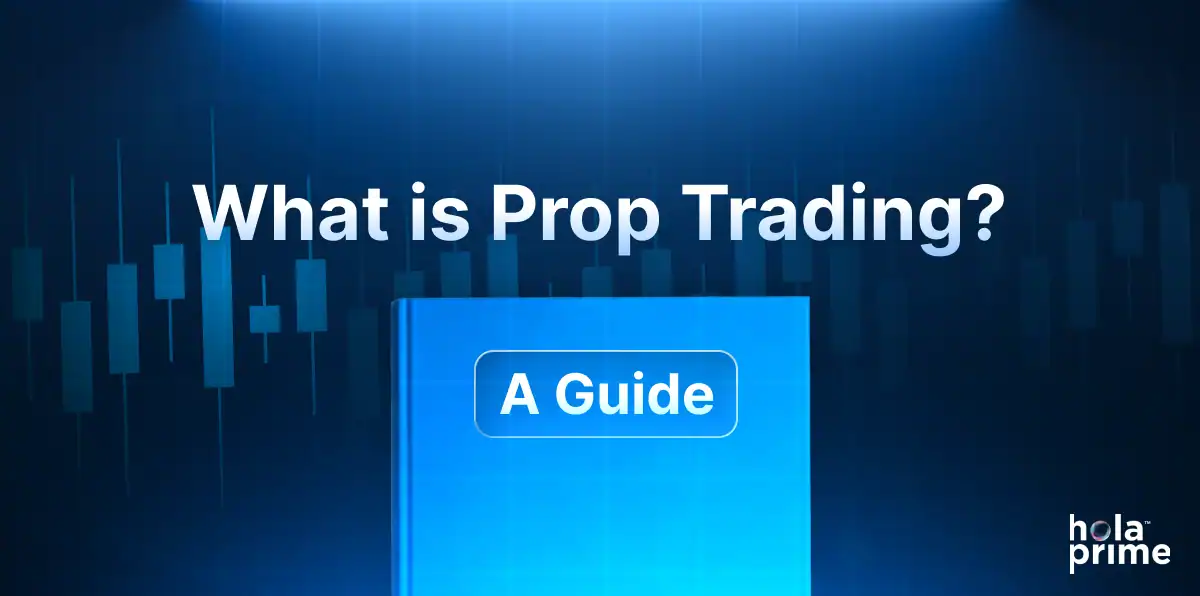Unlike retail trading, where traders risk their own funds and keep all profits (or take all losses), prop trading gives traders access to the firm’s capital. Profits are typically shared between the trader and the firm, while losses are covered by the firm up to the allocated capital. This arrangement often allows traders to control larger positions than they could `with their own money, making prop trading more leveraged than retail trading.
In this guide, we’ll cover how prop trading works, the role of a prop trader, the difference between traditional and modern models, and what to know before getting started.
What Does a Prop Trading Firm Do?
A prop firm invests funds into markets such as forex, crypto, stocks and commodities. They provide capital to skilled traders, giving access to trading platforms, data, and tools. This means traders can trade with capital they may not have access to ordinarily, without risking their own funds (only the initial evaluation fee).
These firms set risk management rules for traders in order to protect their capital. The firm’s capital is protected with strict loss limits, so traders cannot lose the full allocation. Any profits from prop trading are split between the firm and the trader, with the trader usually receiving the larger split.
There are several different types of prop firms – including challenge-based prop firms, instant funding prop firms, desk-based prop firms, forex prop firms and futures prop firms.
The goal of a prop trading firm is to generate profits by providing traders with capital to trade financial markets.
You can learn more about what prop trading firms do in our guide to prop trading firms.
What Does a Prop Trader Do?
A prop trader trades using a prop firm's capital instead of their own. They analyse market data, execute trades (according to the firm's rules and approved strategies), manage risk using risk management techniques like stop loss orders, and meet performance targets.
Most prop traders work remotely, as most prop firms operate online. All you need to begin prop trading is an understanding of prop trading, a trading account, and a solid internet connection – and, of course, to meet the firm’s entry requirements, such as passing an evaluation or challenge.
The goal of a prop trader is to generate profits for the company through either short or long term trading strategies.
Is Modern Prop Trading the Same as Traditional Prop Trading?
No, there are several core differences between modern prop trading and traditional prop trading.
Feature | Modern Prop Trading | Traditional Prop Trading |
Entry | Low fees, smaller accounts | High capital needed |
Funding | Firm provides capital | Often use your own money |
Profit Share | High (70–80% to trader) | Usually lower for trader |
Risk Rules | Strict, automated | Flexible, less structured |
Location | Trade anywhere | Usually office-based |
Traditional prop trading is common in large investment banks, where traders use funds to seek high returns. Modern prop trading usually occurs online, with independent prop firm traders trading with prop firms through evaluation challenges or instant funding models.
Learn the differences between hedge funds and prop trading: Hedge Funds vs Prop Trading
How Does Prop Trading Make Money?
Prop trading generates profits for both the trader and the firm, but the ins and outs differ depending on whose capital is being traded and the trading structure in place.
- Prop firms – Prop firms make a profit by taking a small percentage of prop trader profits. For instance, if a trader generates $10,000 and the profit split is 70/30, the firm earns $3,000 (before any fees, commissions, or other costs). Some prop firms also profit from charging evaluation or challenge fees - the price of which varies from firm to firm.
- Prop traders – Prop traders earn profit through profit splits. They keep a percentage of the profits they generate, while the firm takes the rest. For example, at Hola Prime, traders can enjoy generous rewards of up to 95%. Prop traders do not risk their own capital – they only risk losing their initial fee. Some firms may also provide bonuses for hitting profit targets or for consistent performance.
What Assets Are Traded in Prop Trading?

Prop firms usually provide access to a range of asset classes, which means that as a trader, you can diversify or specialize based on your strategies. Some common assets include:
Forex (Foreign Exchange)
This is the largest and most liquid market in the world, trading trillions every day. Traders buy and sell currency pairs (for example, EURUSD or GBP/JPY), with the goal of profiting from exchange rate fluctuations.
Explore Hola Prime Forex
Stocks & Indices
Traders can speculate on individual company shares or trade stock indices such as the S&P 500, NASDAQ 100, or FTSE 100. With indices, traders can take a position on how an entire market sector performs as opposed to a single company.
Commodities
This can include gold, silver, oil and gas. Commodities are great for diversifying your investment portfolio as they behave differently from stocks.
Cryptocurrencies
Many prop firms also offer crypto trading, which involves trading digital assets such as Bitcoin, Ripple and Ethereum. These offer higher volatility and the potential for larger gains – but this usually comes with increased risk.
Futures & Options
Some prop firms give traders access to derivative products like futures and options. This enables traders to speculate on price movements, hedge positions, or trade volatility.
Explore Hola Prime Futures
Benefits of Proprietary Trading
Prop trading has many benefits for traders wanting to trade without putting all their own capital at risk. With a Prime Account at Hola Prime, you can access $300,000 basic funding, with scaling up to $4 million in demo funds.
Whether you're a seasoned professional or you're looking to start out, here are some benefits of prop trading:
Access to Higher Capital
Instead of being limited to your personal funds, a prop firm gives you access to significant capital. This allows you to:
- Take larger positions
- Diversify across multiple assets
- Capitalize on high-probability setups without over-leveraging personal accounts
Reduced Risk
With prop trading, the firm will absorb losses within its rules. As a trader, you will risk only your evaluation fee or initial deposit rather than your entire savings. This means prop trading has lower personal financial risk compared to self-funded trading.
Access to Tools and Resources
As a prop trader working with a prop firm, you can gain access to:
- Premium trading platforms
- Real-time market data and analytics
- Risk management dashboards
- Mentorship or educational resources
These tools can cost thousands to access if you purchase them independently, but with a prop firm, you can access them as part of your initial fee.
At Hola Prime, you can gain access to top-rated trading platforms such as MT4, MT5, cTrader, MatchTrader, and more. You can also access useful trading tools such as account metrics, account statistics and an economic calendar.
Scalable Earnings
With the right performance, you can grow your income potential quickly. A successful month can mean a huge payout thanks to competitive profit splits.
Flexibility
Modern prop trading firms operate online, which means you can trade from anywhere in the world with internet access. This flexibility is perfect for both part-time traders and full-time professionals. Markets operate almost 24/7 too – for example, the Forex market is open 24 hours a day, 5 days a week. This means you can fit your trading schedule alongside a full-time job, or, depending on your skills and experience, instead of it.
Prop Trading Considerations
- Challenge requirements — Prop firms typically require traders to pass an evaluation, which, if you’re a beginner, can be difficult to pass the first time around
- Strict rules — Breaching daily loss limits or risk guidelines can result in losing funding. Check out our Trading Rules page for information on Hola Prime trading rules.
- Profit splits — Profit splits can vary by firm, so compare options. We offer up to 95% profit split at Hola Prime, depending on your account type.
- Market risk — Trading always carries the risk of losses – but the good news is that you won’t lose your own trading capital – however, you may lose your evaluation fee if you fail the challenge or breach limits.
Getting Started With Prop Trading: A Checklist
- Have a good internet connection
- Learn the basics of prop trading
- Choose your markets – Forex, stocks, commodities, or crypto
- Find the right prop firm
- Prepare your trading strategy and test it on demo accounts
- Have some initial funds prepared to pay for the challenge
- Meet evaluation requirements
- Manage risk – follow strict stop-loss and position sizing rules
Learn more about what you need to be a successful trader in our helpful guide.
Start Prop Trading With Hola Prime
At Hola Prime, we provide traders with capital, advanced platforms, and fair rewards so you can focus on trading without the stress of risking all your own funds.
Whether you’re looking for instant funding or a one-phase challenge, our programs are designed for traders of all levels.


